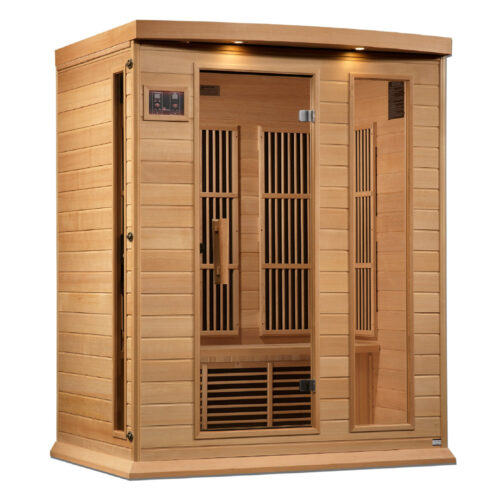Sauna Health Benefits
Saunas are popular and have been for thousands of year. Saunas can be used to relax, unwind and provide other health benefits.
Sweating is a common therapy. Harvard Health Publications claims that the Mayans used sweathouses 3,000 years before. Saunas are used in Finland for thousands of year and one third of Finns use them. Over a million US saunas are believed to be in use.
The effects of a sauna are the same, regardless of the temperature or humidity.
The heart rate and blood vessel diameter increase when a person is in a hot sauna. It increases circulation in the same way as low-moderate exercise, depending on how long you use the sauna.
While using a Sauna, the heart rate can increase by 100-150 beats per minute. It may have some health benefits.
An increase in circulation can help to reduce muscle pain, improve joint mobility, and relieve arthritic symptoms.
The heat of a sauna can also improve circulation and promote relaxation. This can enhance feelings of wellbeing.
Improving cardiovascular Health
A sauna can reduce stress, which may lead to a reduced risk of cardiovascular disease.
In Finland, a study followed 2,315 males aged 42-60 over a period of 20 years. The results suggested that those who regularly use a spa may be at a reduced risk of dying due to cardiovascular disease.
A total of 878 participants died as a result of cardiovascular disease, coronary heart disease or sudden cardiac deaths. The participants were classified according to how often they used saunas, such as once a month, twice to three times per week, or four to seven time per week.
After adjusting for cardiovascular risk factors, increased sauna use was linked with a reduced risk of fatal cardiovascular-related diseases.
Participants who use the sauna twice or three times per week are 22 percent less likely than those who use it only once a month to suffer sudden cardiac death. The risk of sudden cardiac death is 63 percent lower for those who use a sauna 4 to 7 times per week. Cardiovascular disease is also 50 percent lower among those who use a sauna only once a month.
It is important to do more research in order to determine if there’s a link between the use of saunas and a reduction in heart disease deaths.
Sauna use is also associated with decreased blood pressure and improved heart function.
Sauna use is not a substitute for regular exercise to maintain heart health, despite the promising results of some studies. Regular exercise has more benefits than regular sauna use.
Weight Loss
According to scientific studies, your body can burn up to 80 calories per half-hour of sauna time. Although it is not as much as running several miles or doing more physical activity, this is still a pretty good number for just relaxing and sitting. Saunas are not the most effective weight loss option, but combining regular sauna use with physical activity is an excellent way to tone up your body.
Skin Problems
Dry saunas dry the skin while in use. Saunas can reduce symptoms of psoriasis, while atopic skin conditions may worsen.
Asthma
Saunas can provide relief for some asthmatic symptoms. A sauna can help to open up the airways, reduce stress, and loosen phlegm.
Lower risk os Alzheimer’s?
Researchers from Finland published the findings of a study conducted over a period of 20 years that showed a link between sauna use and a reduced risk of Alzheimer’s. The study included 2,315 men between the ages of 42 and 60.
The use of a sauna two to three times per week reduced the risk of dementia by 22 percent and Alzheimer’s by 20 percent compared to those who didn’t. The likelihood of dementia and Alzheimer’s disease for those who use a sauna 4 to 7 times per week was 66 percent lower than that of those who only used it once a month.
Saunas induce a deeper sleep
After the relaxing heat of a Sauna, research has shown that sleep quality improves. The release of endorphins and the fall in body temperature, which is elevated late at night, are both beneficial to sleep. The slow, relaxing decrease of endorphins helps to promote sleep. Many sauna users around the world report that they sleep better after using their saunas moderately.
Health Risks and Precautions
Most people can use a moderate amount of sauna. However, those with cardiovascular diseases should consult a doctor before using.
Blood Pressure risks
It is not recommended to switch between a hot sauna and a cold swimming pool, as this can increase blood pressure.
Sauna use can also lower blood pressure, so those with low blood-pressure should consult their doctor before using it.
Also, people who recently suffered a heart attack should consult their doctor.
Dehydration risk
Dehydration may be caused by fluid loss during sweating. Dehydration may be more common in people with certain medical conditions such as kidney disease. Some people may also experience nausea and dizziness due to the increased temperatures.
If you have any questions or concerns about your health, you should consult with your doctor before using a sauna.
Precautions
In order to avoid negative health effects on the body, it is also recommended that you take these precautions:
Avoid alcohol
Alcohol can cause dehydration, hypotension and arrhythmia.
Do not exceed 20 minutes in the sauna at any one time. For first-time users, the maximum time should be 5-10 minutes. Once they are used to the heat they can gradually increase the time up to 20 minutes.
Drink lots of water It is important that you replace fluids lost through sweating, regardless of the type of sauna you use. After using a Sauna, people should drink between two and four glasses of water.
Do not use saunas if you are sick. People who have been ill need to wait for them to recover before they can go into a sauna. Ask your doctor if you are pregnant, or have certain medical conditions such as low blood-pressure.






